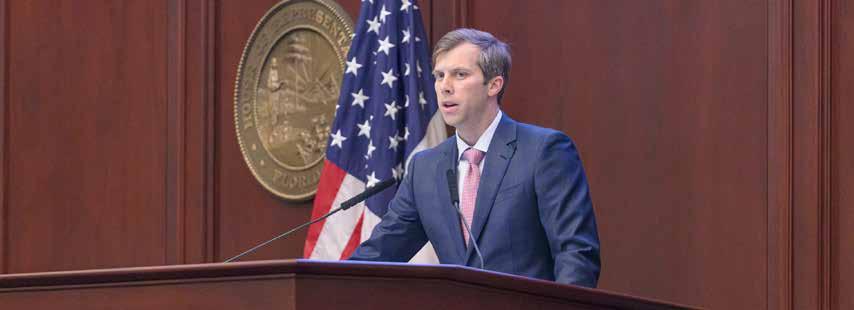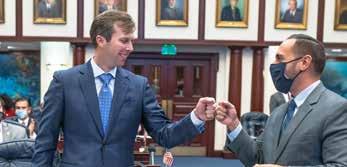
6 minute read
POLITICAL PERSPECTIVE
Legislative Update
by: Rep. Jay Trumbull, House Chairman of Appropriations
When I was elected to represent Bay County in the Florida House of Representatives in 2016, I had three goals in mind: implement policies to create jobs, stop or block policies that kill jobs and advocate for policies that will help continue to create jobs far into the future.
Those policy goals were based primarily on my own experiences as a small businessman, working in our family business growing up, and then having the opportunity to own other businesses along the way. I know firsthand the best thing we can do to ensure Bay County’s prosperity is to give every family’s breadwinner the opportunity to be employed to their highest and best ability.
Unfortunately, I also know that too often, the single biggest obstacle to the job creators of Florida is government at all levels. Too much red tape, too many taxes and too many bureaucracies are job killers. That is why I have advocated strongly for reducing regulation, cutting taxes, and streamlining state agencies. When government does spend money, it needs to be spent on items that will facilitate a strong economy. I have also been an advocate for investing state dollars in public safety, workforce education, and real infrastructure like roads, ports, and bridges.
Last year, I had the honor of being asked by Speaker Chris Sprowls to chair the House Appropriations Committee. In layman’s terms, that simply means he put me in charge of the state’s checkbook. After my House Committee confers and agrees with the Senate Appropriations Committee on the budget, the executive office writes checks accordingly.
Overall, the House’s proposed budget for the 2021-2022 Fiscal Year totals $97 Billion, an increase of 5.2% over the current year. Nearly all of this increase is related to $4.4 Billion of additional federal funds the state has received for the federal share of spending for the Medicaid program, and to help public schools continue to remain open to serve all of Florida’s children.The state portion of the increase is only $387.5 Million, less than 1% over the current year budget.
We also took the strong step to keep more than $5 Billion in reserves for the state’s rainy day fund. Our reserve is one reason why Florida’s state government continues to receive an outstanding credit rating and keep interest rates on public debt to an absolute minimum.
The following includes other aspects of our agenda in several key areas:
Red Tape/Regulation
This year, Speaker Chris Sprowls established the House Regulatory Reform Subcommittee. It has been my pleasure to work with the chairman and several other members of the committee on initia-
tives to reduce red tape and regulation wherever possible. One of the ideas we worked on this year, but will likely have to continue to work on even into the next legislative session, was making it easier for businesses to electronically file required documentation with state agencies. Paperwork, especially redundant paperwork, can cost small businesses valuable resources every year, resources that could be used to hire additional workers or make needed investments in equipment.

Tax Cuts
This year, we took a bold step to pass a bill that would implement tax fairness across the board requiring all businesses engaged in online sales in Florida to collect the sales taxes that Florida brick and mortar businesses are required to collect. With that fairness measure in place, we proposed a significant reduction in the unemployment compensation tax on businesses. This will keep that measure revenue neutral, and will provide our small business leaders with a much-needed break on unemployment taxes.
Directly for consumers, we proposed our annual hurricane tax holiday and a back-to-school tax holiday so our citizens could purchase goods on a day where businesses would not be required to collect sales taxes. We also proposed a Freedom Week sales tax holiday where we would designate the first week of July as a time to be able to buy tickets to concerts, athletic and outdoor events without having to pay sales taxes on those items.
Public Safety
One of the bills with which I was pleased to assist our leadership team in passing was the “Anti-Riot Legislation.” Across the nation in the last year, public displays of political activism have turned violent, causing the loss of property, lives, and people’s trust. While I strongly believe in our constitutional right to assembly, I also strongly believe we must respect private property and our public safety personnel.
We also proposed an $18 million investment to move our state correctional officers from 12 hour shifts to 8.5 hour shifts and to provide more training for new recruits. We have also placed language in the budget to authorize our Department of Corrections to develop innovative plans to address correctional officer salaries and retention for the long-term.
Another key component of our budget proposal this year was a $21.4 Million allocation for the Statewide Law Enforcement Radio System, designed to keep Floridians safe even in the most rural areas and open water of our Florida Panhandle. We invested $7.9 billion in our higher education facilities, and we kept tuition and fees at the current levels to make sure we continue to make Florida’s secondary education one of the most affordable in the country. In addition, we took steps to reconstruct our workforce system with the REACH Act, driving people to jobs in demand.
Real Infrastructure (Roads, Bridges, and Ports)
When we talk about infrastructure, people usually think of roads, bridges, and ports, but this broad topic can also include utilities, housing, water and broadband.
To catch up on the backlog of transportation work, we proposed investing $9.2 billion in the Transportation Work Program, plus an additional $2 billion of federal stimulus funds. This will be a badly needed shot in the arm as we continue to struggle to keep up with our expanding population’s needs.
On the housing front, one of the main steps we took this year was to propose restructuring the distribution of documentary stamp tax dollars currently allocated for the Sadowski Trust Fund.
Under the three-part infrastructure plan, one-third of the existing distribution to the Sadowski Trust Fund would be directed to the Always Ready: Flooding and Sea Level Rise Agenda, to protect our beaches and coastal areas from erosion. One-third ($630 million proposed) would be directed to the Wastewater Grant Program within the Department of Environmental Protection, a priority to get our septic to sewer programs ignited with all due speed. Onethird would continue to be distributed to state and local affordable housing programs, with language that prevents these distributions from being swept to general revenue. This plan will allow funds for all three of these infrastructure priorities to grow at a consistent and predictable rate.
In conclusion, this has been a very active legislative session. I want to give a big legislative note of appreciation to Sen. George Gainer who has been a valuable ally and friend as we seek to serve you in Bay County. I also want to thank our many local elected officials at the county and municipal levels who work tirelessly to keep us abreast of your needs and stand on the front line of public service.
Last, and most important, I want to thank our Chambers of Commerce, their leadership, and all of their members for stepping up to make our county better. Your ongoing commitment to our neighborhoods, businesses and communities is vital, and with your engagement, all we do in state government on behalf of our homefront is magnified ten-fold.
If you have any questions or concerns or need assistance with state government, please do not hesitate to call our office at (850) 914-6300. Our excellent staff is always standing by. I look forward to seeing you in person this summer. Thank you, and may God bless Florida and Bay County.










